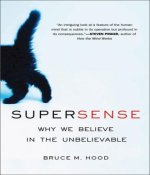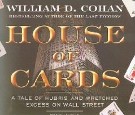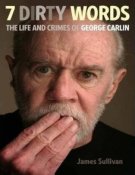JULY 2010
AUDIO BOOK REVIEWS
by Jonathan Lowe
 Are experts usually
right? WRONG author David H. Freedman not only proves that
this isn't so, but that even large funded studies tend to
be wrong more than half of the time. An entire industry of
traveling "expert" speakers distribute ideas that under scrutiny
(or even common sense reflection) only seem to work under
controlled circumstances, while providing the experts with
a framework with which to advance their careers or to sell
programs to gullible group-think credit card holders. As for
the so-called "wisdom of crowds," it is a myth. Groups amplify
bias, squash minority points of view, and can overcome skeptics
with the force of social pressure. For example, jurors routinely
can be made to come to consensus by a strong personality who
dominates the proceedings, and may end up convicting an innocent
suspect. Or remember when an audience cheered a singer in
a reality show contest, then booed the judge who voted "no"?
Maybe they liked the personality of the singer, but it is
the lone judge who was likely right about the talent involved.
Finally, consider the real estate bubble, and all the "experts"
who blew their own bubbles over the heads of entire crowds
of sales people and home buyers before the bubble burst. People
assume that what's popular is best, and that experts are right,
but this is usually NOT the case—a surprising finding
that author Freedman explains, with the help of narrator George
K. Wilson, in this audiobook that would make a great companion
to the book
Bright-Sided. Are experts usually
right? WRONG author David H. Freedman not only proves that
this isn't so, but that even large funded studies tend to
be wrong more than half of the time. An entire industry of
traveling "expert" speakers distribute ideas that under scrutiny
(or even common sense reflection) only seem to work under
controlled circumstances, while providing the experts with
a framework with which to advance their careers or to sell
programs to gullible group-think credit card holders. As for
the so-called "wisdom of crowds," it is a myth. Groups amplify
bias, squash minority points of view, and can overcome skeptics
with the force of social pressure. For example, jurors routinely
can be made to come to consensus by a strong personality who
dominates the proceedings, and may end up convicting an innocent
suspect. Or remember when an audience cheered a singer in
a reality show contest, then booed the judge who voted "no"?
Maybe they liked the personality of the singer, but it is
the lone judge who was likely right about the talent involved.
Finally, consider the real estate bubble, and all the "experts"
who blew their own bubbles over the heads of entire crowds
of sales people and home buyers before the bubble burst. People
assume that what's popular is best, and that experts are right,
but this is usually NOT the case—a surprising finding
that author Freedman explains, with the help of narrator George
K. Wilson, in this audiobook that would make a great companion
to the book
Bright-Sided. |
| "Reality is that which, when you stop believing in it, doesn't
go away." —Philip K. Dick |
 Don't listen to SUPERSENSE by Bruce Hood unless you're unafraid
to consider the origins of your cherished beliefs. With the
subtitle "Why We Believe in the Unbelievable," this audiobook,
narrated by Kerin McCue, is a careful examination of how we
superimpose supernatural explanations onto the natural world,
starting with infancy to age seven, only to then reinforce
those beliefs into adulthood. With cogent clarity, Hood, a
former research fellow at Cambridge, and a visiting scientist
and professor at MIT and Harvard, dissects how early perceptions
and egocentricity play their roles in forming belief systems,
and how these beliefs in supernatural explanations for events
are supported by shared stories within cultures. A child's
intuitive reasoning about the nature of objects and other
living things tends to extend beyond what is actually true,
and so it seems naturally logical to place faith in luck or
fate, or to entertain the idea of magic, even among those
who aren't religious. "Would you," asks Hood, "eat a gourmet
fudge if it was shaped as a dog turd, or wear the cardigan
of a known murderer?" If your answer is no, and you experience
a sense of disgust in the idea, you hold the supernatural
belief that objects can contain foul or evil essences just
by association, and this belief is "essentially" no different
than mid-20th Century New Guinea tribesmen who ate their rivals,
believing their strength or virility could be absorbed. And
it all started in defenseless childhood, before our sense
of the outside world was established, when we thought the
world was made solely for us, that the sun followed us around
with a smiley face, and that even dolls have feelings. Will
we ever get over all our flawed conceptions of reality? Will
radical religions ever stop bombing non-believers and start
reading books like this one? That is unlikely, says Hood,
because a sense of the mutually sacred, while illogical, is
what binds groups together in shared identity. Unfortunately,
it also puts them at war with their "infidel" neighbors.
Don't listen to SUPERSENSE by Bruce Hood unless you're unafraid
to consider the origins of your cherished beliefs. With the
subtitle "Why We Believe in the Unbelievable," this audiobook,
narrated by Kerin McCue, is a careful examination of how we
superimpose supernatural explanations onto the natural world,
starting with infancy to age seven, only to then reinforce
those beliefs into adulthood. With cogent clarity, Hood, a
former research fellow at Cambridge, and a visiting scientist
and professor at MIT and Harvard, dissects how early perceptions
and egocentricity play their roles in forming belief systems,
and how these beliefs in supernatural explanations for events
are supported by shared stories within cultures. A child's
intuitive reasoning about the nature of objects and other
living things tends to extend beyond what is actually true,
and so it seems naturally logical to place faith in luck or
fate, or to entertain the idea of magic, even among those
who aren't religious. "Would you," asks Hood, "eat a gourmet
fudge if it was shaped as a dog turd, or wear the cardigan
of a known murderer?" If your answer is no, and you experience
a sense of disgust in the idea, you hold the supernatural
belief that objects can contain foul or evil essences just
by association, and this belief is "essentially" no different
than mid-20th Century New Guinea tribesmen who ate their rivals,
believing their strength or virility could be absorbed. And
it all started in defenseless childhood, before our sense
of the outside world was established, when we thought the
world was made solely for us, that the sun followed us around
with a smiley face, and that even dolls have feelings. Will
we ever get over all our flawed conceptions of reality? Will
radical religions ever stop bombing non-believers and start
reading books like this one? That is unlikely, says Hood,
because a sense of the mutually sacred, while illogical, is
what binds groups together in shared identity. Unfortunately,
it also puts them at war with their "infidel" neighbors. |
 Along with the idea of superheroes and the undead, are "The
American Dream" and the "almighty dollar" also supernatural
myths? THE BETRAYAL OF AMERICAN PROSPERITY by Clyde Prestowitz
is a chilling examination of why the American Century is over,
and how emerging countries like China will own the 21st. It
unravels the history of our giving up production while increasing
our consumption of imports, and what this portends for the
U.S. unless a radical change of course is undertaken now,
(and Americans get back to work doing what they once did six
decades ago). Ominously, few in America act as if our affluence
or standard of living will ever change, and instead continue
to look to the government for bailouts while watching ball
games on TV. Yet when Treasury Secretary Tim Geitner visited
Beijing University in 2009—and told students there that
the dollar was safe—their response was that THEY LAUGHED.
Not only are our remaining high tech jobs moving overseas,
along with the plants that make computer chips, but service
jobs are moving to India too. To top it off, even as our infrastructure
fails and our debt increases, our baby boomers are only now
starting to retire in record numbers, expecting the government
to help support them. Narrated by Erik Synnestvedt, the audiobook
pulls no punches in attacking the deregulation of the Clinton
administration, the shrug-away "don't worry" attitude of the
Bush administration, and a universal corporate greed that
focused on quarterly statements while lazily wearing blinders
about the future. Unless we start exporting something other
than soda and cigarettes, Prestowitz reveals, Americans will
soon be forced to give up the "something for nothing" mantra
that has characterized our accumulation of debt on the backs
of "third world" producers (including cheap oil for much longer)
as they acquire "first world" status from us by owning all
our industries.
Along with the idea of superheroes and the undead, are "The
American Dream" and the "almighty dollar" also supernatural
myths? THE BETRAYAL OF AMERICAN PROSPERITY by Clyde Prestowitz
is a chilling examination of why the American Century is over,
and how emerging countries like China will own the 21st. It
unravels the history of our giving up production while increasing
our consumption of imports, and what this portends for the
U.S. unless a radical change of course is undertaken now,
(and Americans get back to work doing what they once did six
decades ago). Ominously, few in America act as if our affluence
or standard of living will ever change, and instead continue
to look to the government for bailouts while watching ball
games on TV. Yet when Treasury Secretary Tim Geitner visited
Beijing University in 2009—and told students there that
the dollar was safe—their response was that THEY LAUGHED.
Not only are our remaining high tech jobs moving overseas,
along with the plants that make computer chips, but service
jobs are moving to India too. To top it off, even as our infrastructure
fails and our debt increases, our baby boomers are only now
starting to retire in record numbers, expecting the government
to help support them. Narrated by Erik Synnestvedt, the audiobook
pulls no punches in attacking the deregulation of the Clinton
administration, the shrug-away "don't worry" attitude of the
Bush administration, and a universal corporate greed that
focused on quarterly statements while lazily wearing blinders
about the future. Unless we start exporting something other
than soda and cigarettes, Prestowitz reveals, Americans will
soon be forced to give up the "something for nothing" mantra
that has characterized our accumulation of debt on the backs
of "third world" producers (including cheap oil for much longer)
as they acquire "first world" status from us by owning all
our industries. |
 Looking for a specific example of hubris? In HOUSE OF CARDS
author William D. Cohan details the destruction—from
the inside out—of the investment firm Bear Stearns in
2008, including the moment-to-moment decisions (or lack of
them) made by executives, some of whom were flying off in
helicopters to play golf or to participate in bridge tournaments
during the very hours that their hedge funds were collapsing,
costing investors hundreds of millions. Remember the PBS documentary
on the history of Chicago, which chronicled a time when corruption
and exploitation was a way of life, and aldermen bought votes
while condemning rival ethnic groups to vermin-infested hovels
with busted teeth? Well, those times are mostly gone, but
as Cohan reveals, business ethics haven't really improved
all that much since then, either. We're just more subtle and
sophisticated about it. Ably narrated by Alan Sklar, the audiobook
is, at times, just as tension-filled as any novel, and may
even have some listeners recalling the line at the end of
Joseph Conrad's Heart
of Darkness. . . "the horror. . . the horror." Hence
the subtitle to the book: "A Tale of Hubris and Wretched Excess
on Wall Street."
Looking for a specific example of hubris? In HOUSE OF CARDS
author William D. Cohan details the destruction—from
the inside out—of the investment firm Bear Stearns in
2008, including the moment-to-moment decisions (or lack of
them) made by executives, some of whom were flying off in
helicopters to play golf or to participate in bridge tournaments
during the very hours that their hedge funds were collapsing,
costing investors hundreds of millions. Remember the PBS documentary
on the history of Chicago, which chronicled a time when corruption
and exploitation was a way of life, and aldermen bought votes
while condemning rival ethnic groups to vermin-infested hovels
with busted teeth? Well, those times are mostly gone, but
as Cohan reveals, business ethics haven't really improved
all that much since then, either. We're just more subtle and
sophisticated about it. Ably narrated by Alan Sklar, the audiobook
is, at times, just as tension-filled as any novel, and may
even have some listeners recalling the line at the end of
Joseph Conrad's Heart
of Darkness. . . "the horror. . . the horror." Hence
the subtitle to the book: "A Tale of Hubris and Wretched Excess
on Wall Street." |
 Finally, for a touch of levity on all these shakeups, try
listening to the biography of an outsider who intuitively
knew a lot of this stuff, and we laughed at him for it. Comic
George Carlin may have been taking dope at the time, but he
was no dope. What he was, he claimed, was an astute observer
who never felt that he fit in, be that to mean the local country
club, neighborhood, church, or whatever. He poked fun at society's
foibles, taboos and inconsistencies. In 7 DIRTY WORDS, THE
LIFE AND CRIMES OF GEORGE CARLIN author James Sullivan presents
the journey that Carlin made through a pop era of more conventional
entertainers and TV shows to become one of the most original
of comic thinkers. Censorship was, to him, a yoke to bear,
but it also inspired him. He won a Grammy award for the audiobook
Brain
Droppings. Narrated by Alan Sklar, this audiobook
is also a must for Carlin fans.
Finally, for a touch of levity on all these shakeups, try
listening to the biography of an outsider who intuitively
knew a lot of this stuff, and we laughed at him for it. Comic
George Carlin may have been taking dope at the time, but he
was no dope. What he was, he claimed, was an astute observer
who never felt that he fit in, be that to mean the local country
club, neighborhood, church, or whatever. He poked fun at society's
foibles, taboos and inconsistencies. In 7 DIRTY WORDS, THE
LIFE AND CRIMES OF GEORGE CARLIN author James Sullivan presents
the journey that Carlin made through a pop era of more conventional
entertainers and TV shows to become one of the most original
of comic thinkers. Censorship was, to him, a yoke to bear,
but it also inspired him. He won a Grammy award for the audiobook
Brain
Droppings. Narrated by Alan Sklar, this audiobook
is also a must for Carlin fans. |
|